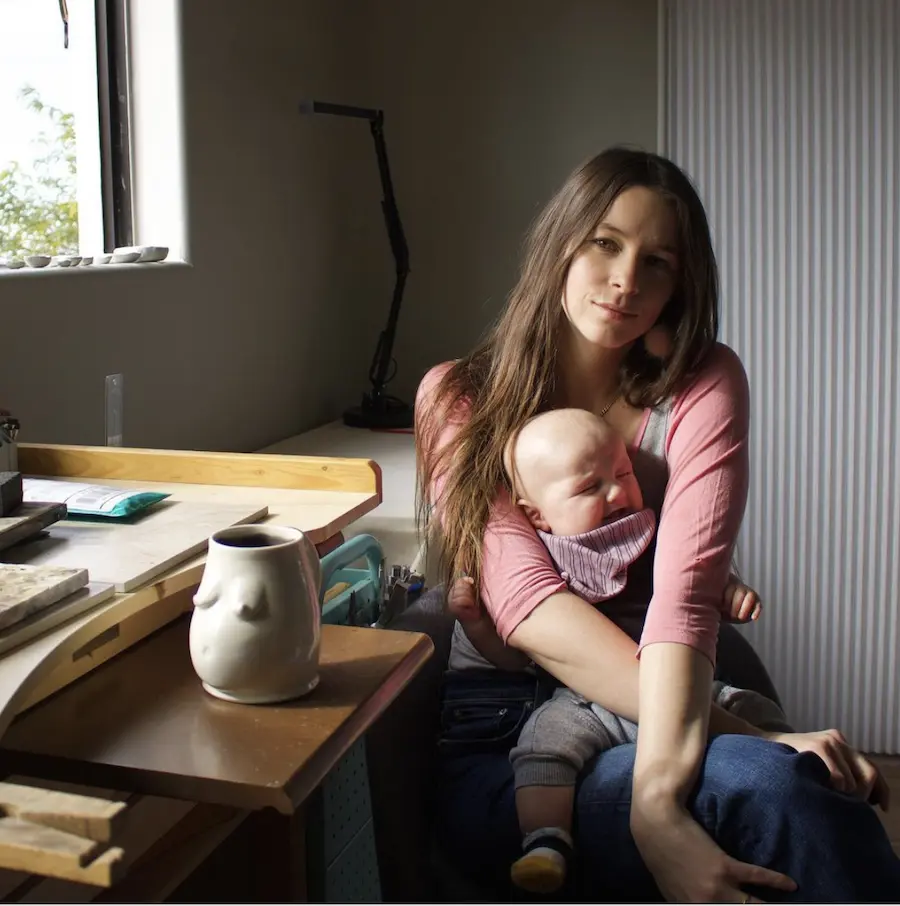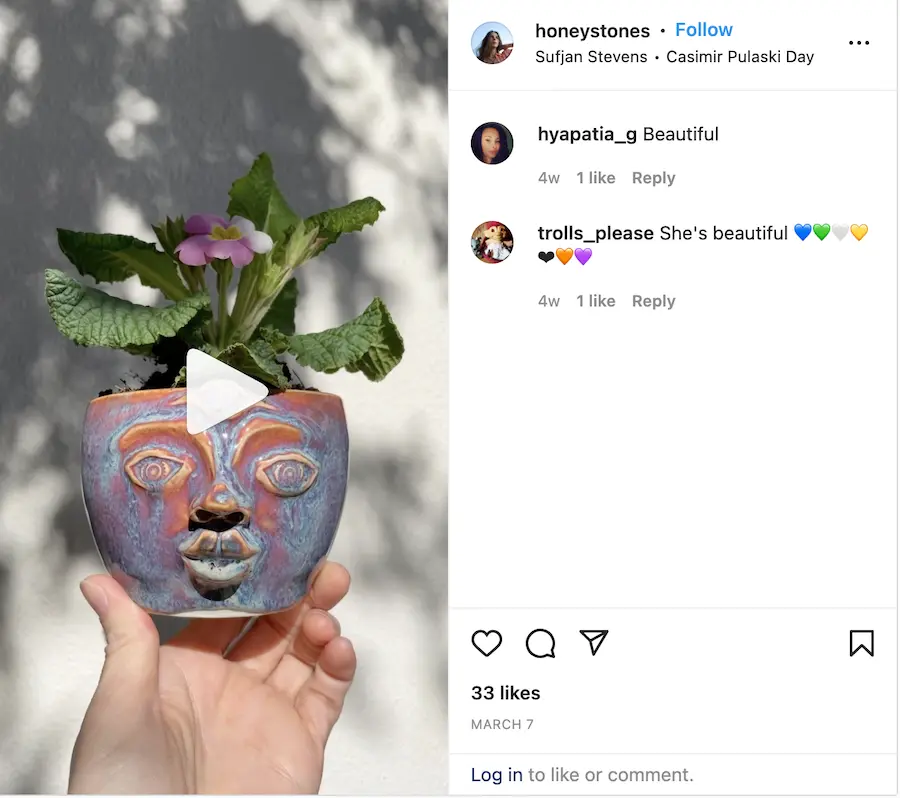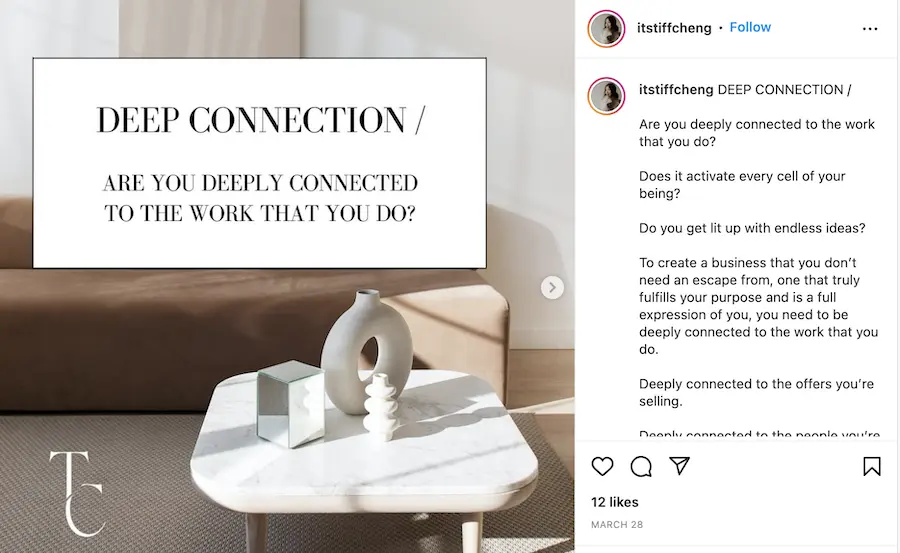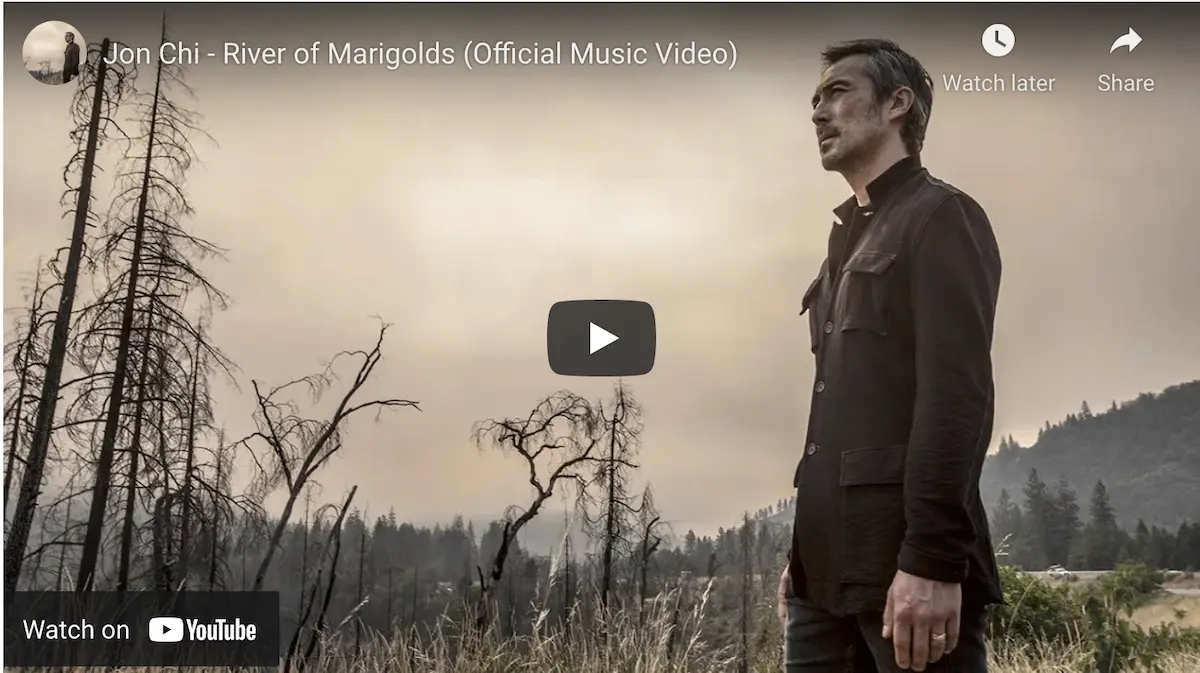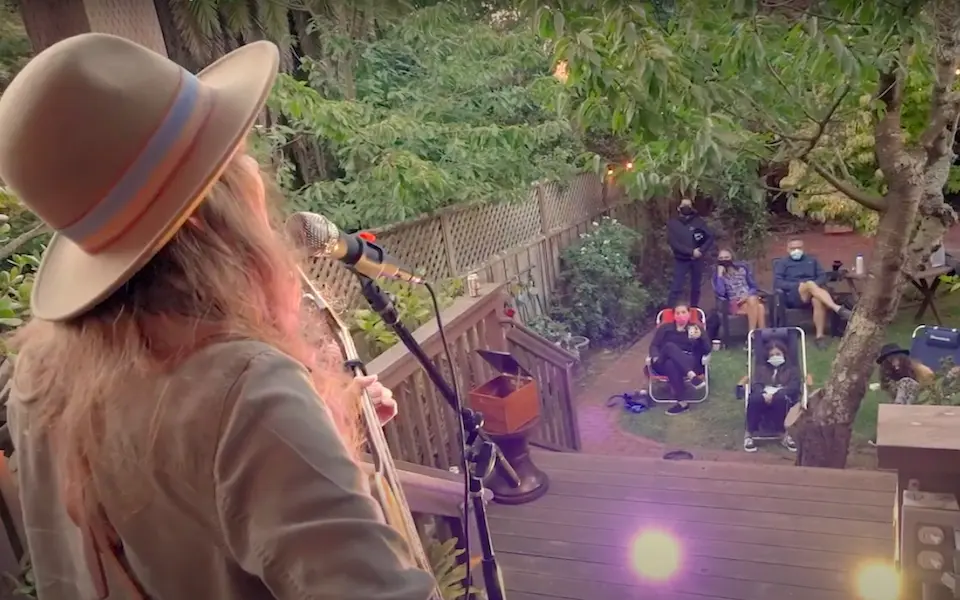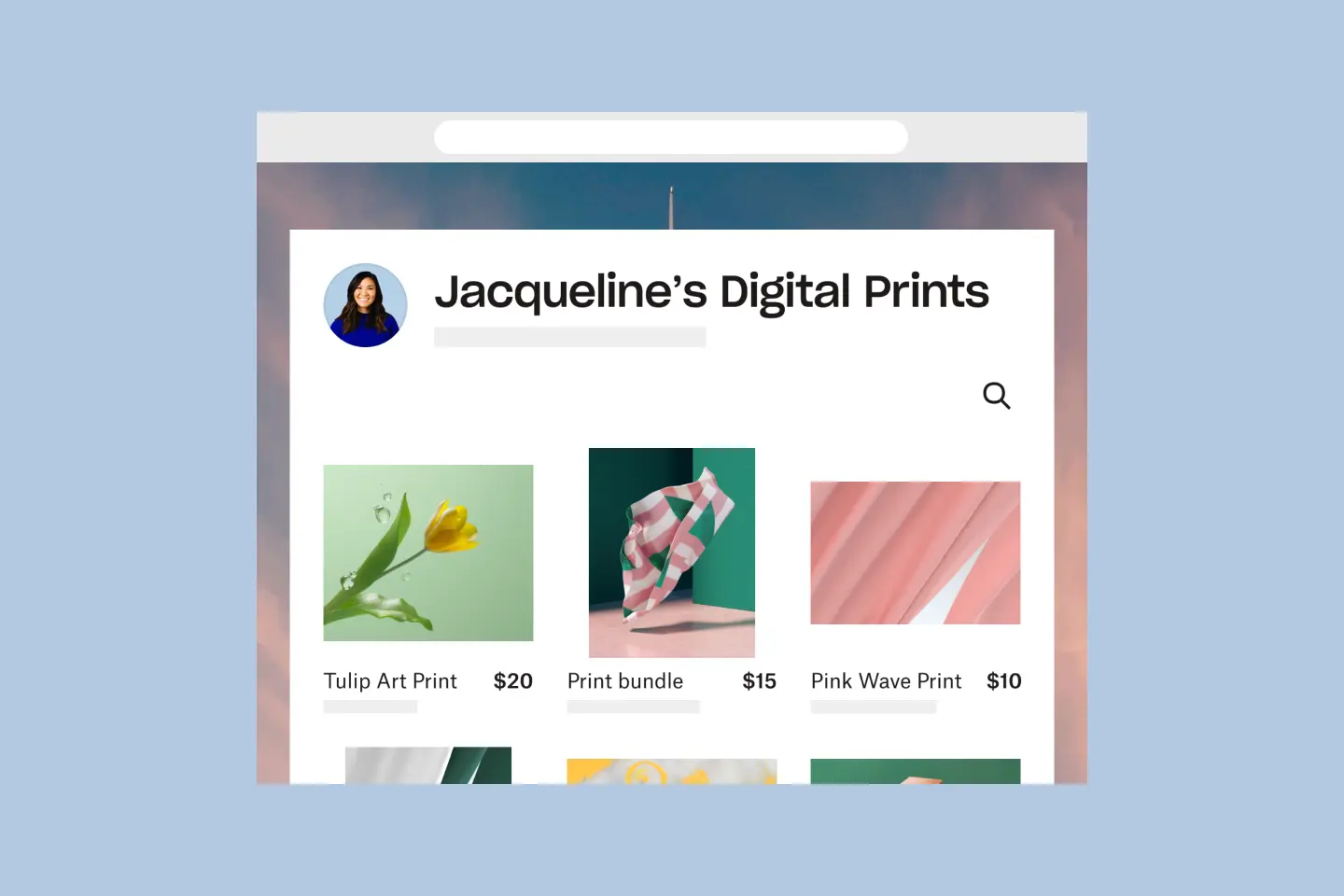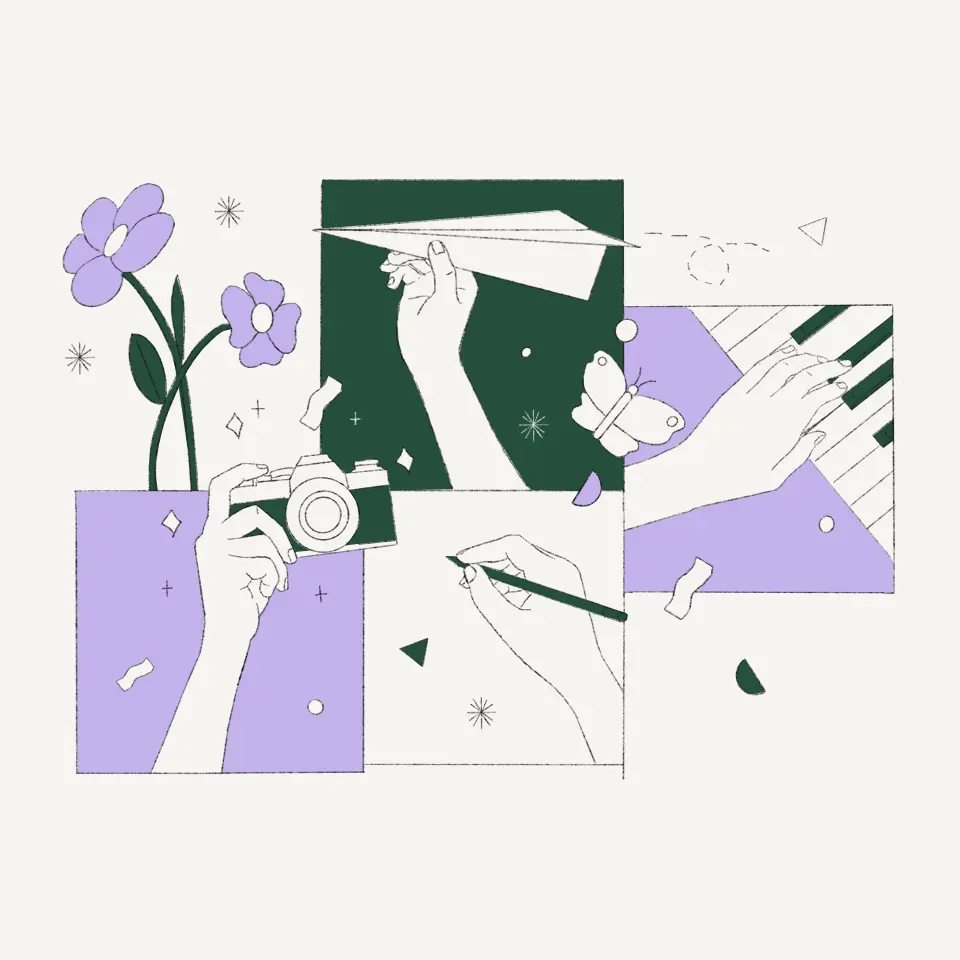
Tips for cultivating inspiration and sustaining your creative flow
When you began, the dream was freedom. Doing the work you love, when you want, where you want—whether that’s your full-time job or your side hustle. Then one day, the algorithm started to seem like a demanding, unforgiving boss.
As some of the most successful creators on YouTube begin wondering whether they should join the Great Resignation, too, we're learning more about why pursuing your passion isn't a guarantee you'll escape the pressure to be productive.
While new platforms make it easier to sell directly to fans who appreciate your niche, the question is: how do you keep them coming back for more while staying true to your muse?
Here’s advice from some who are finding joy in the ebb and flow of life as a creator.
Make the most of uninterrupted moments
Sarah Summer is a metalsmith, musician, and ceramic artist who sells her wares on Etsy and promotes her work on Instagram. Based in Scottsdale, Arizona but originally from Summerville, South Carolina, she’s been following her muse in many directions since she was a child.
“Ever since I was little I've always loved to create,” says Summer. “My mom would have me do crafts from things she had lying around the house, like egg cartons or construction paper or old ribbons.”
Her fascination with creating continued through her school years, but she didn’t know what to do with her artistic skills until after she graduated. That’s when she went to school to prepare for becoming a pastry chef. “Then I realized I could use decorating cakes as a creative outlet.”
Her creative outlets continued expanding to include songwriting, video production, and album cover design.
Since having children of her own, Summer has been perfecting the art of finding focus during the uninterrupted hours of nap time.
“I think because my time is limited, the time that I do have is really freeing,” says Summer. “I'm able to seemingly crank out more in a short time.”
Though her daily routine revolves around her children, Summer’s learned how to move in and out of her flow state when quiet moments arise.
She trusts that her creative rhythm is consistent, so she never feels rushed by deadlines, even when she's working on commissioned pieces. “That's a bonus of being unknown,” she says. “It gives me a sort of liberty to work in song or jewelry or clay whenever I want, putting my hands on whatever I think needs to be made.”
Last year, when Summer was in labor with her son, she had complications that kept her in the hospital for much longer than expected. The experience became the inspiration for one of Summer’s recent records, Belly of the Beast, where she describes the sights and sounds around her in vivid detail.
“I want to remember how I'm feeling, even if it's awful,” she says. “Some parts were truly scary, but I don't want to let that slip by. Because pregnancy is such a short time in a lifespan, but it's so monumental. One reason I wanted to make those recordings was to prove to myself that i'm still here, and I still have a right to keep making music.”
Summer says she didn't want to feel held back by being stuck in the hospital with serious health conditions—just as she doesn’t feel limited by life as a mother.
“The Internet makes it possible for younger and younger people to do such amazing things,” she says. “But there is no cut off in age or walk of life. You can continue to share what you're going through, especially when it’s something people can relate to. I believe there is strength knowing someone has experienced a similar thing. It gives us faith to grow.”
As someone who’s dealt with depression since she was young, Summer learned to use her creative work to process those emotions and sees them as a source of inspiration.
”Feeling lonely or depressed or anxious, it's just a part of life,” she says. “I don't feel like a victim to that anymore. I am empowered by it. Because in carrying that weight, I have something to describe. I take a load off by building a song or 3D art that represents my struggle. By that creation, I now have something tangible that lets me connect with others. Mutual understanding makes my struggle seem less heavy, if only for a moment.”
Don’t let the algorithm distract you from your passion
Tiff Cheng is a Vancouver-based brand mentor, designer, podcaster, and YouTube creator who left her full-time job as a digital marketer to launch her own business as a coach to online creators and lifestyle brands. She remembers going from “zero to one hundred” in the beginning, uploading two videos a week for the first two months.
After creating videos about her experience in the Great Resignation, Tiff attracted more viewers and media attention from the New York Times. But what first seemed like a successful niche soon felt like a pigeonhole because she wasn’t inspired by the idea of making more videos about quitting her job.
“I felt like I was kind of stabbing in the dark, with the algorithm changing so much,” she recalls. “When a piece of content doesn't perform as well as you’d like, I think that's where the burnout happens. It's more me questioning, what's the point of this?”
Cheng says you get in your head and overthink things when you worry about how something will be received before it’s even made. But in her experience, people respond best to what you truly enjoy making.
“As creatives, we're all such multifaceted, multi-dimensional human beings,” she says. “I like to talk about skincare, journaling, meditation, and business, all at the same time. [When] you become a person that people respect, you have brand loyalty from that. From there, whatever you sell, people will want to follow your content because they like who you are, rather than what you do.”
That’s why she decided to stop chasing trending topics and focus on what truly interests her. That included turning her attention from YouTube to other channels.
“When you become a person that people respect, people will want to follow your content because they like who you are, rather than what you do.”–Tiff Cheng
“Instagram has always been my bread and butter because it's the primary platform where I get clients for my coaching business,” says Cheng. “It's fun because you can do regular posts, reels, scheduled live videos, and stories—there are just so many different types of content.”
Rather than building a creator business based on money earned from content itself, Cheng uses her content to attract new clients to her coaching business. And one of the most effective channels for doing that has been her podcast.
“[Prospective clients] binge all of my content, then go to my Instagram, and that's when we start a conversation about potentially working together.”
Draw on influences outside your specialty
Laura Kudritzki is a San Francisco-based fashion and lifestyle photographer who also films and directs music videos such as Spinnin’ Wheels by Jeremy D’Antonio and the recently released River of Marigolds by Jon Chi.
When she’s not on location for a project, Kudritzki restores her creative energy by taking long walks on Agate Beach in Bolinas and letting her mind wander.
“I gain my greatest insight and inspiration among the vast landscapes of the ocean and blonde wheat fields,” she says.
Though she’s best known for having an eye for ideal lighting and seeing new angles where others don’t, not all of Kudritzki’s motivational sources are visual. She also draws inspiration from the written word, including David Lynch's book, Catching the Big Fish.
“I love Lynch's reminder to find serenity through daily transcendental meditation,” she says. “Meditation keeps me grounded, focused, and helps prevent creative burnout.”
She also reclaims her spark by listening to certain records that evoke memories of her family.
“A song I have on rotation is John Prine and Kurt Vile's How Lucky,” she says. “I often listen to it as I bounce down my dirt road on the long ride home. I love hearing my girls singing the line from the lyrics "How lucky can one man be…". This reminds me of the gratitude I feel for the beautiful life I have. I watch my girls become resilient and walk through fear. These are all daily reminders to push myself out of my comfort zone.”
Resist the urge to compare yourself to others
Leila Milki is singer, songwriter, pianist and guitarist, who uses Dropbox to sell personalized bundles to her fans and followers. During the lockdowns when she wasn’t able to tour, she had a creative breakthrough while posting on Instagram. Every day, she would share improvised piano meditations that gave her followers an intimate glimpse of her creative process in real time.
“[The daily piano meditations] removed the pressure and the boxes around releasing something,” she recalls. “It was a perfect extension of what I do sincerely on my own time, anyway. Getting to the core of that stream of consciousness and being able to translate that vulnerability to others is really what it's all about.”
Milki says the healthiest space for her is when she’s able to take the things she thinks about in her daily life and translate that into content that reaches people. But in trying to translate her work into the short-form videos that work best on TikTok, she sometimes finds herself scrolling endlessly through her camera roll in search of images to repurpose.
“Often I fall into that trap because there's so much pressure around releasing consistently,” she explains. “It's just so demoralizing and time consuming if you don't come to those platforms from a space of: I do have something to share today that is actually meaningful to me.”
Recently, she’s found some relief by simply filming her day-to-day activities. She’ll set up a camera while she’s recording, editing, drinking coffee, or going on walks. “People really enjoy seeing other people just go about their days, and that’s the most human form of connection.”
The temptation to try to craft popular content can become a solipsistic trap. “Comparing yourself to others is the most anti-creative state to be in. Yet the algorithms are devised to feel that way.”
Now what motivates Milki most is having an opportunity for connection, even on the smallest scale. “When I'm creating those one-minute improvisations, the fact that I’m doing it for both myself and someone else [feels like] a mutual exchange. That’s my number one source of inspiration and reminder of why I do this in the first place—to come from a place of service.”
“Comparing yourself to others is the most anti-creative state to be in. Yet the algorithms are devised to feel that way.”–Leila Milki
Let the imperfections flow
Whenever Sundance filmmaker James Ponsoldt is working on ideas for a new movie, he often has to fight his perfectionist tendencies. “I'll just rewrite the same thing and get stuck in a thought loop which can become a negative thought loop,” he says.
But when his collaborators notice this happening, they tell him to stop judging and expecting perfection.
“Knowing that I have these tendencies, they really advised me to just ‘vomit out’ a first draft and recognize that no one's gonna read it except you,” he says. “That sense of judgment and insecurity that this is just garbage, that doesn't matter. You are alone and you have an idea in your head. Once you vomit out something—even if it’s this distorted, grotesque, mishmash of ideas—it’s now something that you can shape and relate to.”
As the writer and director of emotional rollercoasters like The Spectacular Now and Sundance 2022 standout Summering, Ponsoldt mines the depths of his interior landscape as part of his process.
“If what you're feeling is stuck, depressed, lonely or anxious—those are all natural parts of being alive. Don't push those down and pretend they don't exist. That same well that you dip into that is inspiration, hope, love, creativity is also anxiety, fear, loneliness. It's all connected. So dignify what you're feeling and realize that creation of any kind begets creation. Writing something every day catalyzes something in you. Just get out and do something. For me, just getting a 30-minute walk in actually can be a great creative act.”
“Creation of any kind begets creation. Writing something every day catalyzes something in you..”–James Ponsoldt
Play one note on a French horn
Megan Slankard is a music producer, multi-instrumentalist, video maker and French horn aficionado, who uses Dropbox to share music with her Patreon supporters. As a multi-hyphenate creator who’s made her living from music since she was a teenager, Slankard has a hard time unplugging from her passion.
“I'm bad at taking time away from music,” she says. “I'm always holding it. The first vacation I ever took away from music was with my sister. We went to Europe together for her birthday. I felt like I was driving in a car without a seatbelt on. I felt like I should be doing something.”
As someone who seems to be constantly working on multiple projects at once, Slankard has no problem being prolific. But when she’s ridingcreative wave, it’s not the hours spent working that alerts her it’s time to take a break. It’s something more subtle.
“I can tell that my creative fire is burning out when I'm not being authentic,” she says. “That happens a lot. It just takes resetting, like, okay, chill out for a second.”
Slankard says she usually notices it happening when the business side gets too overwhelming as she’s getting ready for a tour or record release.
“I know [the business admin tasks] have to happen for me to keep the wheels in motion, but if I don't take a break from that, I will frequently be brain dead,” she says. “But if I'm doing something authentic, I can tell there's a natural buzz, a natural energy. It's the hum they talk about.”
When she feels like she’s sliding into a rut, Slankard has a unique way to push the reset button.
“I filled my house with instruments that I cannot play,” she says. “During the pandemic, I was like, ‘I’m super depressed. My job has stopped. I’m not making any money. I don't know what to do. I'm going to fill my house with instruments I can pick up.’
In one corner of her room, there's a banjo. In the other, there’s a trumpet.
“Somebody gave me their French horn,” she recalls. “For months, I’d go over to the case, open it up, play the one note that I could play, get chills, then put it down, and feel like I just got a shot of sunshine directly into my veins. It's like being a kid again. You're like, ‘What makes it work?’”
Slankard has begun getting more curious about those creative surges. “To keep the fire going, it's about witnessing. It's about noticing when you're uncomfortable. Ask for help. Take some stuff off your plate, then do something challenging that makes you excited.”
To creators who are looking to rekindle that sense of wonderment that can fade away from time to time, Slankard has three to-dos to recommend: “Shut down the electronics. Don't scroll on social media. Play your one French horn note. Sometimes, all you need is a reset.”
